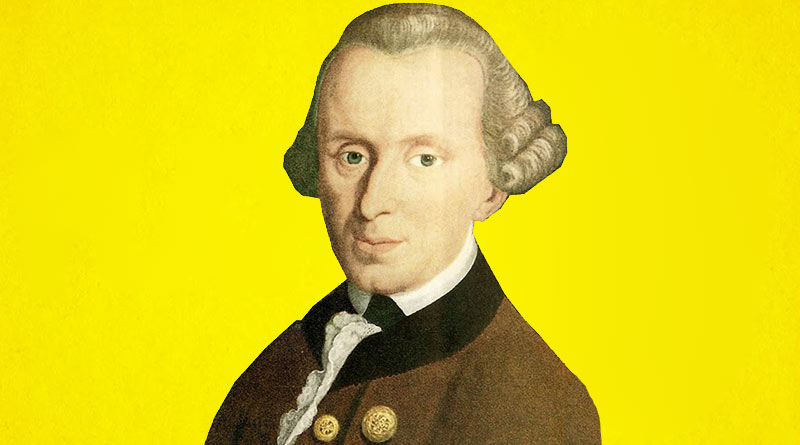
Immanuel Kant is one of the most important and influential philosophers of Western philosophy. He contributed to many disciplines of philosophy and deeply influenced many studies that came after him. Kant has worked in the fields of ethics, politics, art, and epistemology.
Kant receives a letter from Maria von Herbert of Austria in 1791. In her letter, Maria seeks Kant’s advice on dealing with a recent heartbreak that will drive her to suicide.

Great Kant,
I’m asking you for help, comfort, or advice that will prepare me for death, just as a faithful person prays to God.
I’m asking you for help, comfort, or advice that will prepare me for death, just as a faithful person prays to God.
You have written evidence of a future life, but nothing in this life can replace the good that I have lost. Because I loved someone who was the epitome of everything valuable in my eyes, I lived only for him. Everything seemed empty and worthless compared to him. I smothered this person with lies, even though I explained it to him later, which was nothing against my character, nor was there any evil I had to hide in my life.
The lie was bad enough, but his love was gone too. He did not reject my friendship as an honorable man, but the intrusive feelings that drew us to each other are no longer there – oh, my heart is shattered!
If I hadn’t read your work, I would definitely end my life. But the conclusion I drew from your theories stopped me – it is wrong for me to die because my life is torture. For my existence, I must live.
Now put yourself in my place and neither curse nor comfort me. I’ve read the categorical imperative on the foundation of moral metaphysics, and it hasn’t helped in the least. My reason left me when I needed it. Answer me, I beg you – or you will not be advancing at your own command.
Kant sees suicide as a logical contradiction to the ethical decision-making paradigm. His answer is interesting:

Your letter, written from the heart, comes from a heart created for virtue and honesty, for words of such value can only be poured out from someone with a certain understanding.
Such love desires pure communication and expects similar sharing from the person with whom it is addressed, not weakened by an insecure silence. This is the expectation of an ideal friendship.
But there is something in us that limits such honesty, prevents hearts from sharing in common, and locks our thoughts in our minds even in the closest relationships. The exes always complain about this hidden insecurity – ‘My dear friends, there is no such thing as a friend!’
We can’t expect honesty from people because everyone fears being despised when they open up completely to someone. But this lack of honesty, this tight-lipped, is very different from lying. What an honest but tight-lipped person says is not entirely true. A liar knows that what he is saying is wrong. Such a claim is a lie in virtue theory. It may be harmless, but it is not innocent. It is a violation of one’s self-respect; it damages the dignity of humanity in our own person and attacks our origins of thought. As you can see, you are asking for help from a doctor who does not flatter anyone. I speak on behalf of your loved one and show him to you with arguments that justify his faltering in showing his love for you.
Are you reproaching yourself right now because it is unwise to admit this lie or the immorality inherent in lying? Ask yourself this. If it’s the first, regret not being able to fulfill your duty to yourself. Why? Because as a result, you lost your friend’s trust in you. Nothing moral triggers this remorse because it comes from awareness of the consequences, not the act itself. If your reproach is based on the moral judgment of your behavior, then it is the advice of a poor moral doctor to put it out of your mind.
If the change in his approach has been shown to the person you love, only time will gradually extinguish the traces of his righteous anger and transform his coldness into a firmer love. If it doesn’t, the warmth of his initial love is more physical than moral, and it’s already gone – a misfortune we often encounter in life, which must be taken with equanimity. Since the value of life consists of the pleasure we get from people, it is actually quite exaggerated.
Here, my dear friend, the traditional parts of my advice: clarification, punishment, and relief. Dedicate yourself to the first two; relief will come by itself once the effects begin to show.
Kant has one last medicine: time. Only time can heal the emotional pain in the girl’s heart and make their love flare-up. If time does not help, love is “physical” rather than “moral”.

In its shortened form, Maria’s reply is as follows, and Kant did not reply to this letter:
I can see more clearly now. I feel the vast emptiness inside me widen, enveloping me, so much so that I almost see myself as too much, unnecessary for this world. Nothing interests me. An embarrassment torments me that makes my life unbearable.
…even though I let go of these thoughts, I am indifferent to anything that is not related to the categorical imperative and my higher consciousness.
…you may think I’m younger, but the only thing that interests me lately is getting closer to death. If you study this question, you will significantly help me. I’m asking you because my sense of morality is quiet at the moment, although it speaks quite consistently on all sorts of issues. Even if you don’t get the answer I’m looking for, I beg you to offer me something that can fill the unbearable void in my soul.
In 1803, Maria von Herbert committed suicide.
This post is also available in: Türkçe







Yorumlar (0) Add Comment